| Srl | Item |
| 1 |
ID:
141250
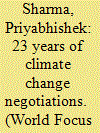

|
|
|
|
|
| Summary/Abstract |
Over the decades, climate change has emerged as an established wisdom of contemporary times. This has happened merely in the span of last three decades. Prior history of the science of climate change was full with controversy and debate. When at the turn of the nineteenth century the Swedish chemist Svante Arhenius (1896) proposed this hypothesis for the first time that man-induced carbon dioxide in the atmosphere of earth would lead to an increase in surface temperature through the greenhouse effect, not many took him seriously. To believe that the climate of earth was changing at a pace and scale far greater than the routine characteristic change forming part of the geological history of earth was too farfetched a contention at that time. For about next half a century as a result of some evidence it came generally to be agreed upon that some sort of climate change was happening but it still remained largely unclear whether this change had been happening in the direction of global cooling or that of global warming.
|
|
|
|
|
|
|
|
|
|
|
|
|
|
|
|
| 2 |
ID:
101792
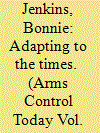

|
|
|
| 3 |
ID:
113594
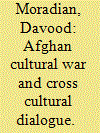

|
|
|
| 4 |
ID:
154421
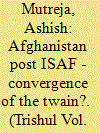

|
|
|
| 5 |
ID:
165763
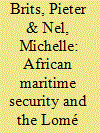

|
|
|
|
|
| Summary/Abstract |
Traditionally the African concept of security concept has been dominated by land-based conflicts with little attention being paid to maritime threats and the protection of the maritime environment. With the rapid escalation of piracy on the East Coast, the African Union (AU) was compelled to develop a joint strategy to address its changing African Maritime Domain (AMD). This was achieved by the AU’s Africa’s Integrated Maritime Strategy (AIMS 2050) in 2014, culminating in the adoption of a binding maritime security and safety charter in Lomé in 2016. The Lomé Charter should ideally focus the general provisions of AIMS 2050 so that Africa, as a continent, can take responsibility for security and economic empowerment of the AMD. This article considers various maritime security documents against the backdrop of an African context for understanding maritime security, in order to evaluate whether the Lomé Charter, as a manifestation of AIMS 2050, will realise its aspirations. Focussing on security is not sufficient and too much emphasis is placed in the Lomé Charter on restriction rather than development. Strong political will and leadership is required to facilitate implementation, identifying common security concerns to ensure better cooperative and collective strategies in a diverse implementation environment.
|
|
|
|
|
|
|
|
|
|
|
|
|
|
|
|
| 6 |
ID:
078437
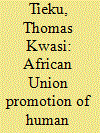

|
|
|
| 7 |
ID:
146644
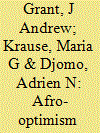

|
|
|
|
|
| Summary/Abstract |
The Africa Day 2015 Symposium provided a unique opportunity to develop glocal networks among activists, learners, scholars, researchers, and community members based in central Canada and other parts of the world. The Symposium examined a wide range of scholarship on Africa including calls for ending oppression based on sexual identity, greater policy responses to health, gender, and human security challenges, improving governance of natural resources, and investigating the prospects for glocal networks. While this scholarship stressed the need for Afro-optimism, it also drew attention to on-going human security challenges faced by many across the continent. This article builds upon the momentum from the Symposium by amplifying the voices of African scholars and enhancing mentorship, emphasizing greater cooperation among researchers and communities based inside and outside Africa, and defeating misconceived allusions to Afro-pessimism. Based on critical scholarship, the article also highlights innovative governance insights that are adapted to specific situations across Africa.
|
|
|
|
|
|
|
|
|
|
|
|
|
|
|
|
| 8 |
ID:
103825
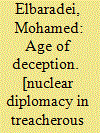

|
|
|
|
|
| Publication |
London, Bloomsbury Publishing, 2011.
|
| Description |
340p.
|
| Standard Number |
9781408817001
|
|
|
|
|
|
|
|
|
|
|
|
Copies: C:1/I:0,R:0,Q:0
Circulation
| Accession# | Call# | Current Location | Status | Policy | Location |
| 055947 | 327.1747/ELB 055947 | Main | On Shelf | General | |
|
|
|
|
| 9 |
ID:
071100
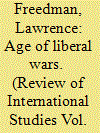

|
|
|
| 10 |
ID:
154988
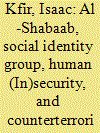

|
|
|
|
|
| Summary/Abstract |
This article examines the link between human security, social identity, and al-Shabaab. The first section explores how social identity group theory can help explain al-Shabaab's recruitment. The second part focuses on the counterterrorism campaign against al-Shabaab, which involves decapitation, aggressive peacekeeping through a proxy in the shape of the African Union Mission in Somalia, and the role of a domestic de-radicalization program. The article concludes that al-Shabaab's allure is in decline and the group is facing internal turmoil, which makes its overtures toward the Islamic State of Iraq and the Levant very dangerous, as al-Shabaab could act as an effective conduit between the Arabian Peninsula and Africa.
|
|
|
|
|
|
|
|
|
|
|
|
|
|
|
|
| 11 |
ID:
076695
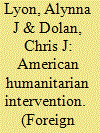

|
|
|
| 12 |
ID:
054854
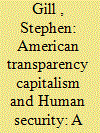

|
|
|
| 13 |
ID:
159623
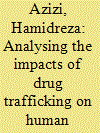

|
|
|
| 14 |
ID:
067124
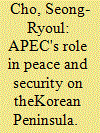

|
|
|
| 15 |
ID:
142913
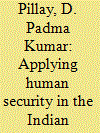

|
|
|
|
|
| Summary/Abstract |
This article explores the concept of human security and examines the scope for its adoption as a normative and policy framework in India. Human security prioritises non-military methods as a means of achieving security without compromising the priorities accorded to traditional security threats. It requires the fulfilment of people’s basic needs and rights. The objective of the article is to show that the human security approach can be usefully applied as a policy measure in India to reinforce successes in the social and economic spheres so that the possibility of dissatisfaction turning into violent opposition and internal conflict is minimised.
|
|
|
|
|
|
|
|
|
|
|
|
|
|
|
|
| 16 |
ID:
118297
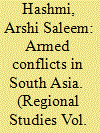

|
|
|
| 17 |
ID:
046546
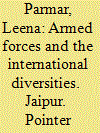

|
|
|
|
|
| Publication |
Jaipur, Pointer publishers, 2002.
|
| Description |
xxviii, 329p.
|
| Standard Number |
8171322972
|
|
|
|
|
|
|
|
|
|
|
|
Copies: C:1/I:0,R:0,Q:0
Circulation
| Accession# | Call# | Current Location | Status | Policy | Location |
| 045423 | 355/PAR 045423 | Main | On Shelf | General | |
|
|
|
|
| 18 |
ID:
142605
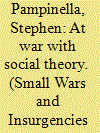

|
|
|
|
|
| Summary/Abstract |
As US counterinsurgency campaigns draw to a close, doctrine for asymmetric warfare written during the War on Terror has come under heavy criticism. While many have argued that this shift to ‘winning hearts and minds’ is evidence that the United States is taking humanitarianism and nation-building seriously, others argue that a wide gap exists between US counterinsurgency doctrine and the protection of civilians afflicted by conflict. In this article, I show that the latter is true by comparing theories of instrumental and communicative action to US doctrine for operational design, stability operations, and counterinsurgency. I argue that these texts treat the people as an object to be manipulated for the achievement of pre-determined self-interested strategic goals rather than members of a community that jointly designs operations to fulfill shared objectives. However, US doctrine does contain communicative elements that, if prioritized, would better support humanitarian and state-building objectives otherwise subordinated in the War on Terror.
|
|
|
|
|
|
|
|
|
|
|
|
|
|
|
|
| 19 |
ID:
108149
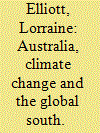

|
|
|
|
|
| Publication |
2011.
|
| Summary/Abstract |
Australia's climate change relationship with developing countries is framed by the 1992 United Nations Framework Convention on Climate Change and the 1997 Kyoto Protocol. Under those agreements, Australia has committed to take a lead in cutting greenhouse gas emissions and to provide technological and financial support to developing countries. In practice, Australian governments of both political hues have adopted a somewhat ambiguous and ambivalent attitude to developing countries within climate change politics and their fulfilment of those commitments has been uneven. This is particularly so if the concept of the 'Global South' is expanded from developing countries to include those people who are vulnerable to the environmental, social and economic impacts of climate change.
|
|
|
|
|
|
|
|
|
|
|
|
|
|
|
|
| 20 |
ID:
131424
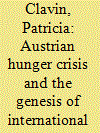

|
|
|
|
|
| Publication |
2014.
|
| Summary/Abstract |
From its foundation in 1918, the new Austrian republic was gripped by famine and a crisis of confidence in its currency that threatened to tip the new state into hyperinflation and revolution. This article shows how western efforts to aid Austria combat famine and its financial crisis were linked, and how they had a profound impact on the new League of Nations, the world's first multi-purpose intergovernmental organization. It also demonstrates the importance of the incipient wartime international bureaucracy for League agency. Contrary to the expectations of its architects, member governments, international financiers, businessmen and economists began to see the League as a useful tool to meet common needs that today would be called the search for human security. The article demonstrates how the Austrian food and financial crisis was the founding moment in the institutionalization of international economic and financial coordination, cooperation and oversight. It established the Economic and Financial Organization of the League of Nations, whose work would later inform its successors, the International Monetary Fund, the World Bank and the European Union. The study speaks to the ways in which the notion of security has broadened in the past two decades to embrace economic, social, political and environmental concerns. But the notion of 'human security' is not new; it was written into the body of the League.
|
|
|
|
|
|
|
|
|
|
|
|
|
|
|
|